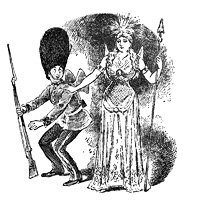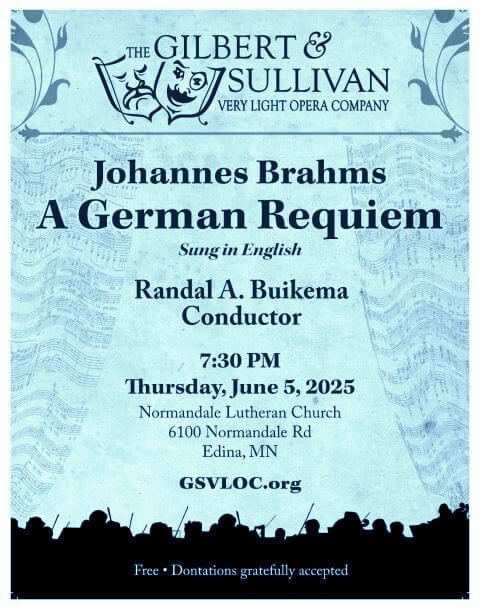

Johannes Brahms – A German Requiem
June 5, 2025
Johannes Brahms – A German Requiem Program
The Gilbert & Sullivan Very Light Opera Company presented Johannes Brahms: “A German Requiem,” with chorus, soloists, and orchestra under the direction of Dr. Randal Buikema.
The piece was performed at Normandale Lutheran Church in Edina, and was described in the program as follows:
Johannes Brahms (1833-97) never said definitively why he composed his German Requiem, but he sketched out one theme in 1854, during the final illness of his mentor and great friend Robert Schumann, and completed six movements after Brahms’ own beloved mother died in 1865. A rapturously received 1868 performance of this version for mixed chorus, baritone soloist, and full orchestra assured Brahms’ fame. Afterward, he added a soprano solo (now the fifth movement) as a memorial to his mother. The final shape of the piece mirrors the arch-like structure of much of J.S. Bach’s music, which Brahms admired: quiet, consoling Movements 1 and 7; drama in Movements 2 and 6; soloists joining the chorus in Movements 3, 5, and 6; and a gentle central choral Movement 4 evoking a home in Heaven.
The musical tradition that Brahms inherited from Mozart and Berlioz was to memorialize the dead by setting the Latin-language text of the Roman Catholic requiem mass. While he was knowledgeable about Martin Luther’s German-language translation of the Bible, Brahms was religiously agnostic, considering himself a humanist. In fact, he wanted to name the piece “A Human Requiem.” For his text, he started from scratch, choosing passages from both the Old and New Testaments that address universal concerns for those left behind: the fragility of life, the inevitability of death, the pain of grief, and, with patience, eventual acceptance and even joy. The first words the listener hears are “Blessed are they that mourn; for they shall be comforted.” The closing words are “Blessed are they who die in the Lord, blessed, blessed.”
Brahms set the words in German to make them accessible to his listeners. This evening’s performance in English accords with Brahms’ use of the vernacular.
Edie Stern
Participants
Conductor
Dr. Randal Buikema
Chorus and Soloists
Sopranos
Maggie Benham, Katelyn Breen, Kelly Danger, Kat Felicis Ioco, Amanda Jensen, Mary Kettlewell, Therese Kulas, Laura LeVoir, Anna Maher, Mallory Rabehl, Molly Schindler, Karen Toebe, Angela Walberg
Altos
Janice Barbee, Mary Benbenek, Claire Bias, Willow Gerhard, Alice Golter, Mary Gregory, Liza Hartshorn, Shawn Holt, Holly MacDonald, Lisa Sinclair, Rhea Sullivan, Lara Trujillo, Natalie Wishcop, Sarah Zuber
Tenors
Joe Andrews, Scott Azbill-Salisbury, Robert Banks, Don Barbee, Tom Berg, Jonathan Flory, Ron Jay, Trenton Johnson, Matt Polum, Bryan Reed, Graham Remple, Lowell Rice, Anthony Rohr, Seth Tychon Steidl
Basses
Adam Arnold, John Azbill-Salisbury, Waldyn Benbenek, Scott Benson, Scott Gorman, Ryan Johnson, Nick Menzhuber, John Orbison, Richard Rames, Niko Simmons, Mike Tober, Rick Treece, Sam Vinitsky, Trevor Woggon
Orchestra
Violin 1
Victoria Athmann – Concert Master
Sue Bennefeld, Maya Gitch, Beth Henningsen, Amy Letson, Suki Sun
Violin 2
Karen Kozak, Lorine Menzhuber – Orchestra Manager, Betsy Lofgren, Karen Neinstadt, Mackenzie Powell
Violia
Louis Berg-Arnold, Ann Bur, Laura Bidgood, Teresa Mager, Aija Ronis
Cello
Aaron Barrett , David Downing, Sara Hertz, Holmberg Kimble, Hayley Zacheis
Bass
Jason Anderson, Ann Marie McIntire
Flute
Suzanne Benson, Joseph Wypych
Piccolo
Nancy Hagfors
Oboe
Debbie Clapp, Donna Votino
Clarinet
Louise Buckley, Brian Krysinski
Bassoon
Elizabeth Brandt, Gene Scholtens
Contra Bassoon
Alice Anderson
French Horn
Mike Engh, Ken Lovely, Bob Olsen, Cristina Werling
Trumpet
Pete Berg, Bob Zobal
Trombone
Jason Adriano, John Herman, Charles Watt
Tuba
Aaron Rolloff
Timpani
Emily Curran
Keyboard / Harp
Jean Orbison Van Heel